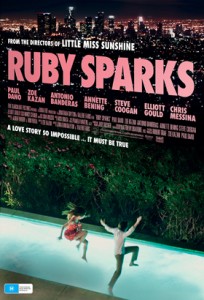
Ruby Sparks, a clever indie-style romantic comedy from writer and actress Zoe Kazan, looks and feels much like the events that you imagine would take place once the luminous shine of “… and they lived happily ever off” has worn off in a fairytale.
Not that the world that self-absorbed, socially awkward writer Calvin Weir-Fields (Paul Dano) inhabits in modern day Los Angeles is even close to a fairytale in nature.
It is anything but.
He is cruelly enmeshed in an enduring bout of writer’s block that will not let him go, has no real friends save for his brother Harry (Chris Messina) to whom he is quite close, and struggles to deal with the devoted fans of the his best selling novel, written at age 19, which is close to becoming an American classic and to which he is manifestly unable to produce a sequel.
But something magical does happen one day when, at the suggestion of his therapist, Dr Rosenthal (Elliott Gould), he imagines what it would be like if someone came along who actually got along well his dog Scotty (named after F. Scott Fitzgerald) who is afraid of people (much like his owner) and recoils from any meaningful interaction with anyone but Calvin.
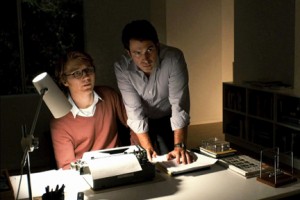
He finds such a person in a dream one night when he meets the delightful Ruby in a park. She immediately bonds with Scotty, even though she finds it odd that you would pay homage to a writer you love by naming a dog after him. Upon waking Calvin is so smitten, and inspired that he spends day and night writing, unable to spend time away from the almost real woman he has created in what is fast becoming his next novel.
It is no different to what happens to most writers. Their creations, brought to life by words, and given life by imagination, feel real and when you’re writing, it is as if you’re spending time with them. It is not unusual for an author to speak of their characters, particularly their favourite ones, as if they are flash and blood creatures capable of leaping off the page at any moment.
But in Calvin’s case, Ruby comes to life for real, and Calvin finds her, much to his dismay, downstairs in his apartment making a meal. Convinced he has finally gone mad, he first locks himself in a room, and then hides under his desk while he calls Dr Rosenthal, Harry; in fact, anyone who will answer the phone.

Ruby is mystified by his reaction. As far as she is concerned, imbued with a full backstory that begins in Dayton, Ohio and includes a love of art and Humphrey Bogart and John Lennon, she and Calvin are in a happy loving relationship, just as he described in the book, and so his fearful responses to her presence perplex her.
Rightly convinced, as any one of sound mind would be, that he has finally descended into the sort of madness that plagued creative types such as Lord Byron and Van Gogh before him, he attempts to rush out of the house to “run errands”, only to find Ruby won’t take no for an answer and wants to to tag along.
It’s at this point, when an amorous fan he meets in desperation hoping she can drag him back to the safe bounds of sanity, and the waiter at the care where they meet can both see and interact with a now understandably upset Ruby, that he begins to accept he may not be crazy after all.
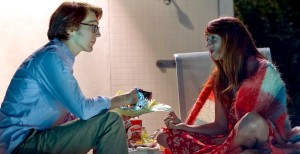
Which of course raises a far more unsettling scenario.
That he has brought Ruby to life by some means beyond his explanation.
But Calvin is so enamoured of his new unexpected love that even when Harry pushes him to try to work out how he manifested Ruby, and tries to persuade him that he “owes it to men everywhere” to see how he can manipulate his now-girlfriend, Calvin (since anything he writes, she is and does), he refuses to take it any further, or write any more of the book, content to simply spend time with Ruby as she is.
They spend all their time together, going on dates to outdoor movie theatres and games arcades, cooking for each other, even going so far as to meet his Calvin’s New Age mother (played to brilliant comic effect by Annette Bening) and her partner, Mort (Antonio Banderas, who makes the ugliest driftwood furniture known to man).
In short, they look, act and feel like a real couple.
But of course, this is real life, and while Ruby’s emergence into Calvin’s day to day world may have been miraculous, the pressures of living life and maintaining a relationship are anything but, and Calvin and Ruby like all couples everywhere find the gloss begins to wear off their new love over time.
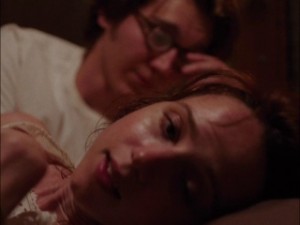
And it’s at this point that the movie takes a darker but wholly realistic turn. As Ruby becomes more and more her own person, and grows beyond the initial template Calvin created for her, she grows restless for new adventures and interests, no longer content to stay within the narrow bounds of Calvin’s idealised image of her.
Calvin, for his part, has no intention of ever growing beyond the small but perfect idyll he wrote about in the book, a failing that the ex-girlfriend he pines for, Lila, points out ends up stifling anyone in a relationship with Calvin.
After an almost manic and deeply unsettling scene in his study where he makes it clear to a horrified and desperately saddened Ruby that he is the puppet master and she is nothing but a marionette at his mercy by making her involuntarily speak in French, and declare her love for him over and over even as she dances herself to exhaustion, simply by typing on a page, he finally realises that this is not how love should be.
And he sets her free …
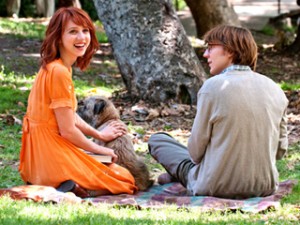
What follows, while Hollywood-esque in some ways, reflects the unique sensibilities of Zoe Kazan’s bright and witty script that balances light and shade, romance and reality, and hope and crushing disappointment all in equal measure.
It is brought to life with a deft touch by the directors Jonathan Dayton and Valerie Faris, who bring the same feeling of surreal whimsy married to grounded reality that they brought to their previous collaboration, Little Miss Sunshine.
It’s this ability to ground a fantastical premise in the here and now and make it seem wholly believable that is Ruby Sparks calling card. The film works because no matter how unreal the genesis of Calvin and Ruby’s relationship, the lessons learnt are painfully real.
Calvin particularly comes to understands that love is only really worth something if the person truly loves you of their own accord. Afraid that people only love him because of the book he wrote, the temptation posed by Ruby to have a “love” that is predictable and controllable always within his grasp proves to great for his fragile sense of self to withstand.
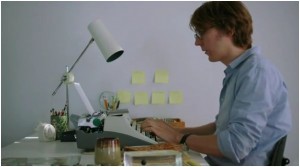
It is only when he witnesses the pain and suffering his narcissistic need for this control causes to the woman he purports to love that he relinquishes his hold over her, and with a few typed words on a page, and anguish on his face, lets Ruby go.
Profound lessons yes but they are never handed out in a heavy handed manner and Ruby Sparks ends as it began – balancing the sometime darkness of real life with the fantastical possibility that just around the corner lies something new and wonderful.
And all of it willfully and tantalisingly beyond anyone’s control …